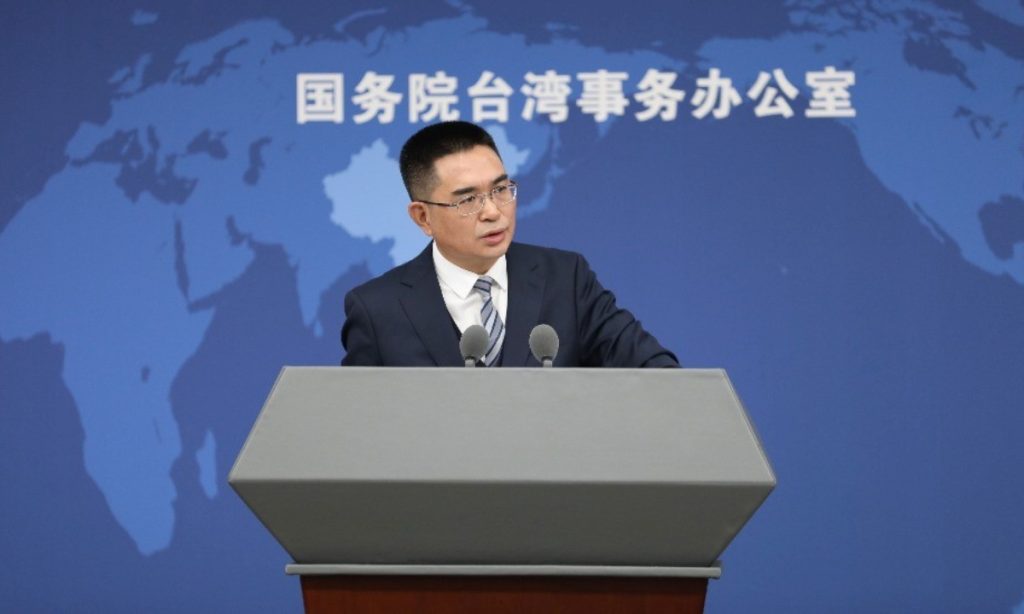Lai Ching-te's fabricated fallacies will be swept into dustbin of history: Taiwan affairs office spokesperson on Lai's speech

In response to Taiwan regional leader Lai Ching-te's first so-called "10 Talks on the Country" speech, Chen Binhua, spokesperson for the Taiwan Affairs Office of the State Council, issued a strong rebuke, stating that Lai's remarks were filled with lies and deception, hostility and provocation, and his distortions of history, reality, and legal principles will only be swept into the dustbin of history.
Chen noted that the speech deliberately distorted and fragmented history, aggressively promoted separatist "Taiwan independence" fallacies, and attempted to fabricate a theoretical basis for "Taiwan independence" in order to justify his political agenda, including advancing a so-called "mass recall" campaign for personal political gain.
The speech was a blatant "Taiwan independence manifesto," inciting confrontation across the Straits, and was also a patchwork of deeply flawed and misguided separatist rhetoric, which fully exposed Lai's obstinate nature as a die-hard "Taiwan independence" advocate, said Chen.
Chen said Lai deliberately distorted the island of Taiwan's history in his speech, denying the historical fact that the island has been part of China since ancient times. He rejected the reality that the indigenous peoples of Taiwan originally migrated from the Chinese mainland and ignored the long-standing administrative governance of Taiwan by successive Chinese governments. Such statements, Chen stressed, are a blatant distortion and trampling of history.
Chen also noted that that Lai turned a blind eye to the historic sacrifices made by people on both sides of the Taiwan Straits who united to resist foreign aggression and restore Taiwan to the motherland. Chen condemned Lai for attempting to associate the patriotic feelings of Taiwan compatriots with the notion of "Taiwan independence," calling it a betrayal of and crime against Taiwan's proud patriotic tradition and the legacy of countless martyrs who sacrificed themselves.
Chen further criticized Lai for deliberately misrepresenting key historical facts and legal documents. He said Lai attempted to erase the victorious outcomes of World War II, dismissed internationally binding legal documents such as the Cairo Declaration and Potsdam Proclamation, and distorted UN General Assembly Resolution 2758. By falsely claiming that "Taiwan does not belong to China" and promoting the idea of "non-subordination" between the two sides, Lai openly challenged the authority of international law, Chen said.
He added that Lai's inflammatory remarks disregarded the strong desire of the Taiwan public for peace, development, exchanges, and cooperation. Instead, Lai exaggerated the so-called "mainland threat," promoted a set of "17 counter-strategies," advocated confrontation with the mainland, intensified "green terror," and sought to obstruct cross-Straits exchanges — all of which run counter to public sentiment and the will of the people.
"History cannot be falsified, facts cannot be denied, and truth cannot be reversed," Chen said. He reiterated that all historical, factual, and legal evidence confirms that Taiwan has been an inseparable part of China since ancient times. Archaeological discoveries and historical records demonstrate that the Chinese people were the earliest to develop Taiwan. From the Song and Yuan dynasties onward, successive central governments established administrative control over the island. In 1885, Taiwan was designated as a province by the Qing Dynasty — the 20th province of China at the time.
Chen recalled that Japan's occupation of Taiwan in 1895 was a result of the unequal Treaty of Shimonoseki, but post-WWII international agreements reversed that outcome. The 1943 Cairo Declaration, 1945 Potsdam Proclamation, and Japan's instrument of surrender all stipulated that Taiwan must be returned to China. On October 25, 1945, the Chinese government recovered Taiwan and resumed sovereignty over the island. With the founding of the People's Republic of China on October 1, 1949, it became the sole legitimate government of China and the only legal representative of China in the international community. The government of the People's Republic of China naturally and fully enjoys and exercises sovereignty over Taiwan., Chen noted.
He added that subsequent political documents between China and Japan also reaffirmed Taiwan's return to China. "Taiwan has never been a country, and it is an integral part of China," he stressed. "The one-China principle is a basic norm in international relations and a widely recognized consensus in the international community."
"Taiwan's future can only be decided by the more than 1.4 billion Chinese people, including our compatriots in Taiwan," he said. "No matter how hard Lai tries, he cannot change the legal fact that Taiwan is part of China, shake the international consensus on the one-China principle, or stop the inevitable trend of national reunification," Chen added.